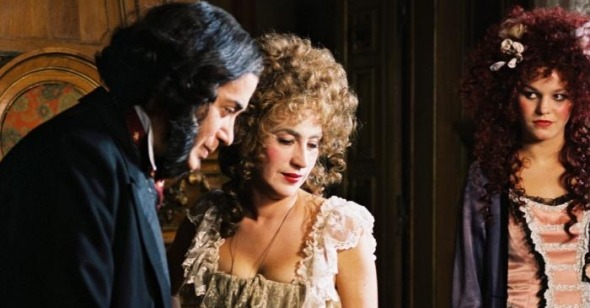Muddy Waters
by Michael Koresky
The Northern Land
Dir. João Botelho, Portugal, no U.S. distributor
The rarefied and mostly impenetrable The Northern Land is hardly the first film from 59-year-old Portugese filmmaker João Botelho, but for most of us on these shores it might as well be. Unlikely to be seen in the U.S. outside of the confines of the New York Film Festival, Botelho’s film will remind devoted festivalgoers at times of Rohmer (The Lady and the Duke’s digital backdrops to fussy historical drama), Rivette (forthrightly artificial play-acting), Raul Ruiz (affected Proustian time-collapsing), Maddin (its opening moments, surrounded by irises, appear as though glimpsed through a kinetoscope), and most markedly the director’s fellow countryman and preeminent cinema centenarian Manoel de Oliveira, with whom Botelho seems to share a penchant for a discursive meta brand of filmmaking. And like a handful of Oliveira’s films, this one is based on a novel by Agustina Bessa-Luís (Inquietude, The Uncertainty Principle). Of course, Botelho’s film is reminiscent only of a small portion of Oliveira’s oeuvre—which has gone through so many permutations and sensibilities since Portuguese cinema’s silent age that to reduce it to one mode, even by comparison to another film, is to betray a misunderstanding of it—and The Northern Land needs to be looked at only on its own terms in order to see its shortcomings.
Shot in crystalline high-def video, The Northern Land is a purposely disorienting multigenerational saga narrated as though a family mystery. Ana Moreira is a young woman, Rosamunde, who’s attempting to unpack, literally and figuratively, the history of her family all the way back to 1860, and specifically the at-times scandalous lives of her grandmother, great-grandmother, great-great-grandmother, as a means, presumably of understanding herself—though aristocratic through marriage, worry not, the film reminds us that grandmother Rosalina was independent, liberal, and scorned monarchy. It’s the kind of film that states its intentions early and often (“Why go over an enigma that is 100 years old?” fusses grandfather), yet which gets off on its own almost militant emotional vagueness and narrative ambiguity, calling attention to its own artifice, arranging its actors in ornate tableaux as though posed mannequins, etc. It’s the kind of film where the Big Themes are ripe for the picking for any zealous, literate movie analyst (Memory! Cultural Identity! Collective History!), but one would have to bend over backwards to try and connect its various tangled threads in any emotionally meaningful or narratively engaging way.
The Northern Land surveys a century of tumultuous family history, and Botelho, of course, localizes it all in the person of one actress. It’s almost de rigueur in art films now for one woman to play multiple roles (they’re all the same anyway, right?), and one of The Northern Land’s major problems is with Moreira herself. Embodying five generations of women, she’s a constant screen presence, and a thoroughly unlikable one at that. With her fibrous demeanor and snapping overbite, Moreira is perhaps properly remote for Botelho’s aims, but she’s undeniably taxing as any of her incarnations; there’s little life in her—a drawback for an actor embodying five characters, to say the least. The film switches between time periods, although its jumps are hardly ever timed with narrative crescendos, so it’s hard to gear up much interest, or even to suss out the compelling differences between the various women Moreira plays other than with broad strokes: Rosalina is haughty, Águeda is sad. By the time each new character arrives (like Rosalina’s grandson, Tristan, a gambler and ladies’ man introduced while being bathed naked by his sister as he stares off with the requisite dazed look), not only is it hard to find our bearings, it’s hard to bring ourselves to care to. Of course, we are being intentionally distanced: time is purposely collapsed, and artificiality is heightened. And in case we miss the film’s high modernist aims, grandfather’s there searching in vain for that darn Walter Benjamin book that’s gone missing.
The only alleviation from the film’s unrepentant airlessness is its employment of crisp video cinematography, which at least creates a visual clarity in contrast to the film’s dense thicket of narrative. With its overstuffed interiors, in which every errant object pops with almost three-dimensional vibrancy; its ghostly beautiful, highly contrasted images of tree branches creating a web against darkening evening sky; and its black, velvety shots of barely perceptible darkness, The Northern Land can certainly lay claim to some of the most enveloping digital imagery yet captured. Yet for every moment of clarity (in matters of visual resolution only, perhaps) there are ten instances of nonsensical (or nonsensically translated?) dialogue like: “For Tristan gambling had the eroticism of final realities.” Come again? The Northern Land doesn’t seem to serve a purpose beyond its musty theoretical conceits; it’s never clear why Rosamunde’s uncovering of the truth should matter to anyone other than herself. Watching Botelho’s interminable film is meandering and uninvolving, like rummaging through a stranger’s old boxes of family junk.
